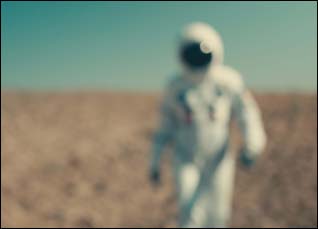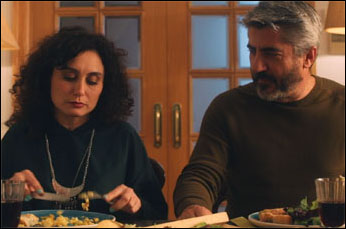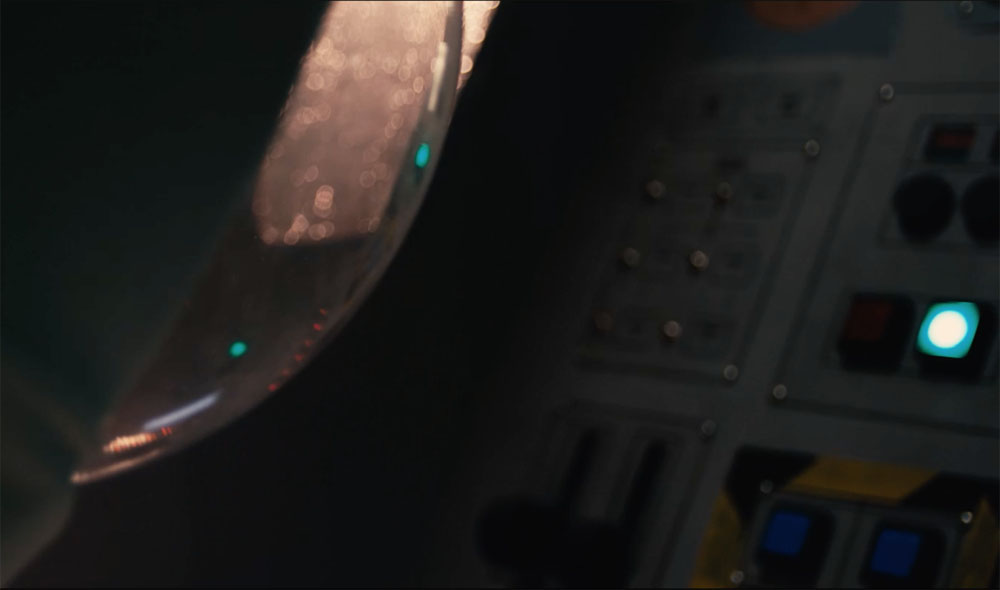Jorge Moratal was in the midst of gathering his things to make a move to the U.S., having been accepted to USC’s School of the Cinematic Arts, when he realized he might not waste the newly empty space in his parents’ house before departing Spain.
“It was the last thing I did before moving to L.A.,” says Moratal of what would become “One Small Step.” “We built the spaceship in my parents’ garage, and right after that shoot, I moved out of the house. [laughs] They didn’t have to ask me to move out, but I’m like probably the next short film, I’m not going to shoot it here, don’t worry.”
There are likely bigger things in store for Moratal after “One Small Step,” but creating a mission control inside his parents’ humble home is indicative of the already large feats he can pull off, in this case working with co-director Nacho Garvia on a comedic short where an astronaut underestimates how big the universe really is as he tries to safely maneuver a crash landing. A selection of the Cleveland Film Fest and the Pittsburgh Film Fest, among others, the film builds to an unexpected punchline that is a specialty of the filmmaker, who previously made the equally clever short “Omniscient” in which a dinner party is accompanied by some unwanted narration.
Sharing a wry sense of humor and an ability to honor a high-concept idea with execution on a comparable scale, the films have made Moratal a director to watch and as “One Small Step” continues to make its way at festivals around the world, he graciously took the time to talk about how he did NASA-level reconnaissance to get the spaceship’s panels right, using sound to build something larger than life and how he found a creative team he can trust.

“One Small Step” I co-directed with my friend Nacho Garvia, who’s also from Madrid, Spain, and the idea came to us just by basically meeting every Sunday at this coffee shop to come up with ideas for our short film and I don’t know how much coffee we had to drink to come up with that idea. It’s a pretty short short film, so [we thought] it probably won’t take us that long to make, but then we spent the next four or five months working on it because we had to build a spaceship and a space suit. The helmet was such a struggle because we basically did everything ourselves.
What was it like constructing that set?
We storyboarded the entire script first, so we knew exactly what we were going to see and what we weren’t, so that made it easy and also cheaper because we didn’t have to build the entire spaceship. We basically had that panel [for the spaceship] in front of him and the windows, but it was all about getting creative because we were working on a very tight budget and this set was basically my parents’ garage because we needed a place that could be very dark, so we could really control the lighting around the spaceship, so it would look like the sun outside the window.
You’re able to create so much of the atmosphere in the film with sound, and obviously, it’s such a big part of “Omniscient” as well. Is it a starting place for you?
Yeah, it’s certainly cheaper to build a world with sound instead of image because whatever you want to show, you actually build and shoot if you want to show it through image whereas you can have the sound of the spaceship’s engine without showing the engine. It works on a subconscious level where the viewer understands there’s a spaceship without actually having to see it.
And both short films are built around the final joke – they’re very short with a punchline at the end, and with “Omniscient,” it was something similar. I thought it was really funny to have a narrator who you actually realize at the end is there in person, saying all this shit about the people in front of him out loud, so it was just reverse engineering that and trying to figure out who are the characters and what is the situation. I thought it makes sense to have a very civilized dinner and the narrator would be disturbing that space even more. I also wanted to shoot something that could be affordable and manageable with only five characters and one location because I made that one when I was 20, so I didn’t want to do anything crazy.
It seems like such a contrast to “One Small Step” with that big a cast. Was there much of a difference?
Yeah, it’s pretty different in the way you work. And in “One Small Step,” we wanted to do it with someone who we’d really trust who was our friend [because] we knew that if we’re asking [someone] to do this 20 times because of one of those technical reasons, it’s not someone who’s going to be annoyed if I ask. “Omniscient” was more about finding professional actors who could also bring their experience to the table, especially Manolo Soto, who plays the narrator and is a pretty big actor in Spain. He just made “The Good Boss” with Javier Bardem and working with him, especially at such a young age [for me], really taught me a lot about acting and directing actors.

Yes, my main collaborator is Alex Arteaga, our cinematographer, who I met in film school in Madrid. Ever since I met him, the first thing we realized we had in common is we live pretty close by, so I would give him rides and that’s when we started talking about films. We realized we’re both very into the Coen Brothers and Edgar Wright, so we’re like, “Oh, we should work together.” Then what happened was my friend Nacho [Garvia] watched “Omniscient” — he became the co-director of “One Small Step,” but we went to high school together and we hadn’t really kept in touch since we graduated, but when he saw the short film and the credits and he goes, “I know this guy. I know Jorge,” so that’s how we got together and started talking about making a short film together.
How did you gravitate towards comedy as a filmmaker?
I don’t know why I gravitated towards comedy, but Edgar Wright, the Coen Brothers,or Billy Wilder were the filmmakers I really liked and I also write short stories and even there, I tend to also write comedy. I guess it’s easier to see people enjoy it if you’re watching “One Small Step” or “Omniscient” in a theater with a hundred people or whatever and they’re laughing, it’s like, “Oh they’re enjoying it” whereas if you’re making a drama, it’s hard to really know if they’re liking it or not.
Did you actually get to see “One Small Step” in a theater during its festival run?
I did. What’s funny is we’ve sent to festivals both in Spain and the U.S. so Nacho has been going to the ones in Spain and I’ve been going to the ones in the U.S., but because of COVID, the only one I’ve actually attended here in the U.S. was the Corderiella International Film Festival, which takes place in Reno. We’re like, “Oh, it’s an eight-hour, nine-hour drive from L.A., so I thought it would be nice to drive across California and see Reno and Lake Tahoe and that was a really nice experience.
“One Small Step” is currently playing the festival circuit and “Omniscient” is available to watch here.




